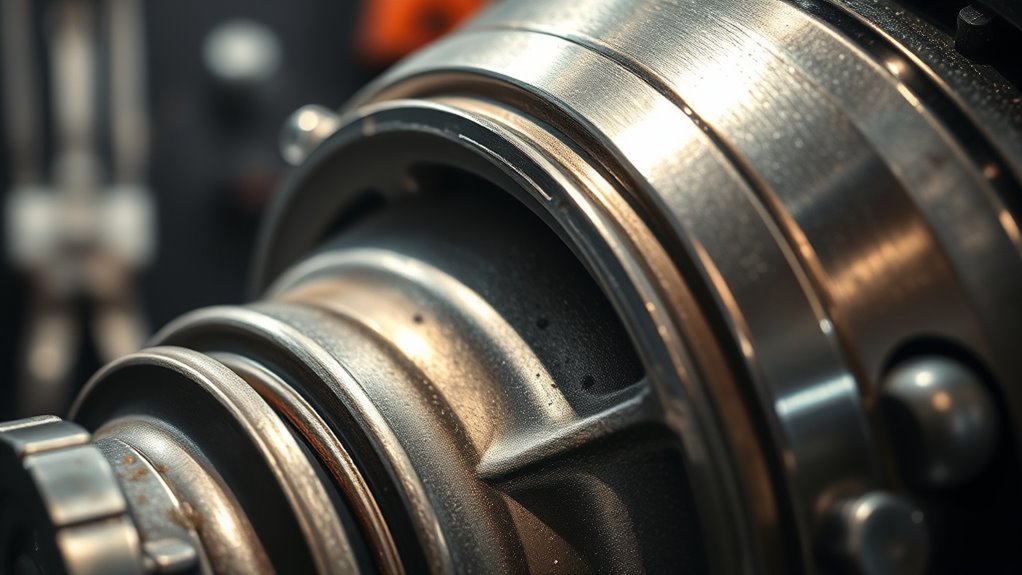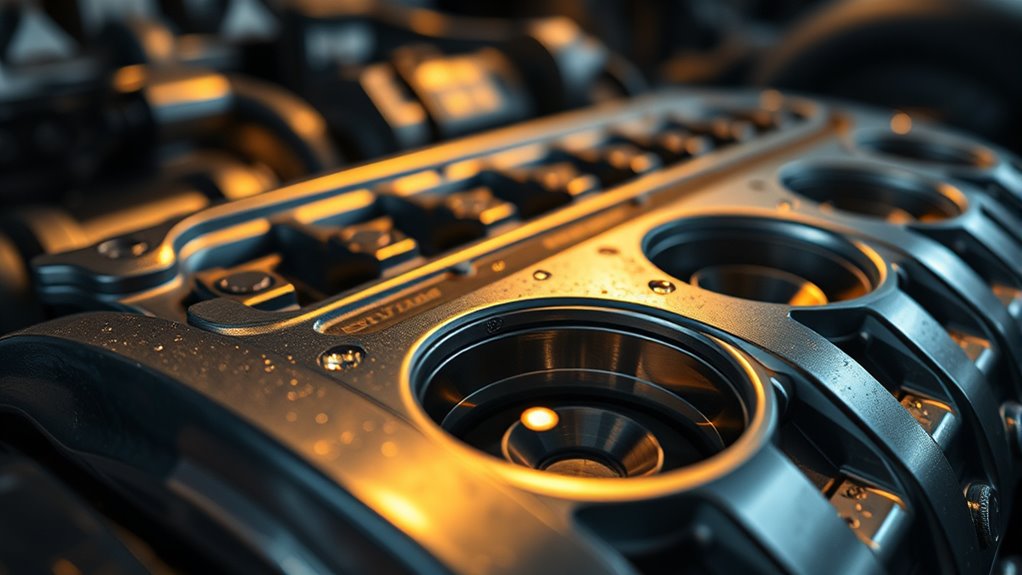Knocking sounds in your engine usually happen because of timing issues, misfires, or improper fuel combustion. If the spark ignites too early or late, it can cause knocking or pinging noises. Other causes include carbon buildup inside the engine, worn components, or using low-quality fuel. These problems disrupt normal operation and can lead to engine damage if ignored. To find out more about how to fix it, keep going to get all the details.
Key Takeaways
- Engine misfires or faulty ignition components cause rhythmic knocking or tapping sounds.
- Incorrect fuel ignition timing leads to early detonation, producing knocking noises.
- Carbon buildup inside engine parts alters combustion and can create knocking sounds.
- Fuel mixture issues, such as being too lean or rich, affect combustion and cause knocking.
- Worn engine components like pistons and valves disrupt proper ignition, resulting in knocking noises.

Have you ever heard a knocking sound and wondered what’s causing it? Knocking noises from your vehicle can be unsettling, and understanding the root cause helps you address the issue quickly. One common reason is an engine misfire, which can produce a rhythmic knocking or tapping sound. When your engine misfires, one or more cylinders aren’t firing properly, disrupting the smooth combustion process. This can happen for several reasons, such as faulty spark plugs, worn ignition components, or issues with fuel ignition timing. If the spark doesn’t ignite the fuel at the right moment, the combustion inside the cylinder becomes uneven. This uneven combustion creates a knocking or pinging sound that can be mistaken for other mechanical problems.
Knocking sounds often indicate engine misfires or ignition timing issues needing prompt attention.
Fuel ignition plays a vital role here. Proper fuel ignition ensures that the air-fuel mixture burns efficiently, generating the power needed to propel your vehicle. If the ignition timing is off—say, the spark occurs too early or too late—it can lead to knocking sounds. This is especially true when the fuel ignites prematurely in the combustion chamber, causing a knocking noise known as “detonation” or “knock.” Such early ignition can be triggered by using low-quality fuel, carbon buildup inside the engine, or faulty sensors that control ignition timing. When fuel ignites too early, the pressure inside the cylinder spikes rapidly, leading to that characteristic knocking sound.
Besides ignition timing issues, other factors can contribute to knocking sounds related to fuel ignition. For instance, if the fuel mixture is too lean (not enough fuel), the engine may run hotter, increasing the likelihood of knocking. Conversely, a too-rich mixture (excess fuel) can cause incomplete combustion, also resulting in knocking noises. Carbon deposits on pistons or valves can alter the combustion process, affecting fuel ignition and leading to knocking as well. Additionally, engine components such as pistons, valves, or the cylinder head can be affected by knocking, resulting in further damage if not addressed promptly.
Addressing knocking sounds involves diagnosing these underlying issues. Checking the spark plugs, ignition timing, and fuel mixture can often pinpoint the cause. If your engine misfires or you hear knocking, it’s essential to get your vehicle inspected promptly. Ignoring these sounds can lead to more severe engine damage, costly repairs, or decreased fuel efficiency. Keeping an eye on how your engine runs and responding quickly to unusual noises helps maintain your vehicle’s health and ensures smooth, trouble-free driving.
Frequently Asked Questions
Can Knocking Sounds Indicate Engine Failure?
Knocking sounds can sometimes indicate engine failure, especially if caused by an engine misfire or poor fuel quality. If your engine knocks persist, it could mean internal issues like piston problems or timing issues, which might lead to failure if untreated. You should have a mechanic inspect your vehicle promptly. Addressing engine misfire and ensuring you use good quality fuel can help prevent serious damage and knocking sounds.
Are Knocking Noises Always Dangerous?
Knocking noises aren’t always a sign of disaster, but they can be a warning flag, like a canary in a coal mine. Sometimes, they’re just minor engine issues, but other times they signal serious problems needing engine repair. Ignoring the sound can jeopardize your vehicle safety, so it’s best to have a mechanic check it out early. Addressing knocking sounds promptly helps keep your car running smoothly and safely.
How Can I Prevent Knocking Sounds From Occurring?
To prevent knocking sounds, you should prioritize regular engine maintenance, including oil changes and spark plug inspections. Keep an ear out for unusual noises and perform sound diagnosis early to catch issues before they worsen. Make certain your engine components are in good condition, and avoid aggressive driving. Proper maintenance and prompt diagnosis help maintain smooth engine operation, reducing the chances of knocking sounds and potential damage down the line.
Do Knocking Sounds Only Happen in Older Vehicles?
Knocking sounds aren’t just a relic of older vehicles; they can happen in any car, like unexpected shadows. You might notice this noise affecting your fuel efficiency and causing vehicle vibrations, regardless of age. Modern vehicles with advanced engines and fuel systems can also develop knocking due to issues like bad fuel or ignition timing. So, don’t assume it’s only old cars—any vehicle can experience knocking sounds.
What Tools Can Help Diagnose Knocking Noises?
You can use diagnostic tools like OBD-II scanners to identify engine issues causing knocking sounds. Sound analysis apps or digital stethoscopes help you pinpoint the exact source of the noise by amplifying and isolating it. These tools make it easier to assess whether the knocking is related to engine timing, fuel issues, or mechanical problems, so you can take the right steps to fix it quickly and efficiently.
Conclusion
So next time you hear that knocking sound, remember it might just be a coincidence—your engine’s way of telling you something’s off. Sometimes, it’s as simple as fuel quality or timing issues, but other times, it’s a sign to get it checked out before things get worse. Don’t ignore that noise; it’s like a coincidence that could save you from a bigger problem down the road. Stay alert, and trust your instincts.









